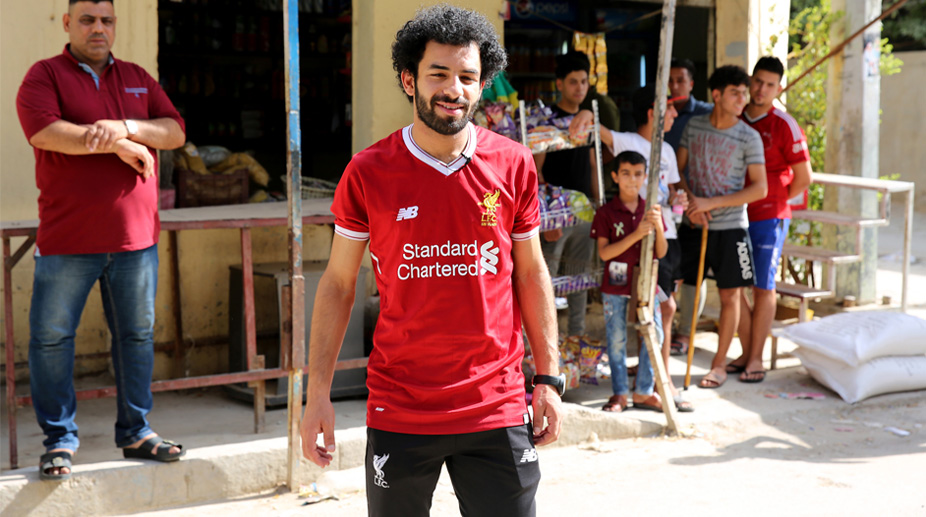Premier League: Chelsea beat Wolves to move up to fourth
Chelsea ended their five-match winless streak in the Premier League with a 3-1 victory over Wolverhampton Wanderers at Stamford Bridge and moved up to fourth in the table.
Lately, the “Mohamed Salah of Iraq” can’t leave his house without being stopped for photographs or approached by football fans who mistake him for the Egyptian star.

Hussein Ali (Photo: AFP)
With his black beard, curly hair and football shirt, Iraqi striker Hussein Ali is often mistaken for one of the world’s top players: Egypt’s Mohamed Salah.
In the Iraqi capital Baghdad, 20-year-old Ali is frequently stopped in his working-class Hurriya neighbourhood by people wanting a photograph with their idol.
Advertisement
Although he is himself a striker, for the Al-Zawraa club, it is Ali’s likeness to Salah which piques Iraqis’ interest.
Advertisement
“At the first training session, he introduced himself as ‘Hussein Ali’. I replied, ‘No, no, you are Mohamed Salah,” said Ali’s coach Adnan Mohammad.
Back when Salah was playing for AS Roma, Ali was aware of the resemblance but took the comments as “a joke”.
But when the Egyptian shot to global fame in the Premier League — becoming “the number one footballer for all Arabs” according to Ali — his Iraqi doppelganger started to seriously work on his image.
Since then, he has started wearing the red shirt of Salah’s club Liverpool.
“It’s the real shirt, bought from an official supplier,” he said proudly from his small house, where the shutters are closed against the Baghdad heat during the long hours of electricity cuts.
Ali said he paid 40 for the shirt, which he takes carefully from its hanger, while working every day to support his large family and without a wage from playing football.
Lately, the “Mohamed Salah of Iraq” can’t leave his house without being stopped for photographs or approached by football fans who mistake him for the Egyptian star.
“The day before yesterday I was in a mall; the security guards, the shop workers and the clients, everyone wanted to take a photo with me… even the girls!” said Ali.
He attracts similar attention at his own football matches: “When I played against the Lebanese club Al-Ahed, people were taking photos with me for an hour and a half.”
Last month Ali joined a group of supporters in the city centre to watch Salah’s Liverpool take on Real Madrid in the Champions League final.
“When Mohamed Salah was injured, there were some who came to see me as if it was me who was suffering,” he said.
“In my neighbourhood, over a number of days, people who passed me would say ‘Get well soon’,” he remembered, laughing.
While such confusion amuses him, Ali’s similarity to Salah has prompted him to rethink his own life.
Passionate about football since he was little, Ali made it onto the B team of Al-Zawraa, Iraq’s most decorated club.
One day he hopes to live the same dream as Salah, who was thrust from his Nile Delta village into the heart of international football.
“We play in the same position and I do everything to imitate and copy his movements,” said Ali, smiling widely.
The Iraqi player is also keen to follow Salah’s example off the pitch, which in the past has led English fans to adopt an “I’ll be Muslim too” chant praising the footballer.
“He reads the Koran and he asks God to help him before his matches. I also read the Koran and pray, like Abu Makka,” said Ali, using a nickname for the Liverpool striker who named his daughter after the Muslim holy city of Mecca.
After Salah’s injury fans globally were on tenterhooks to find out if their hero would be going to the World Cup which kicks off on June 14.
He has now been included in The Pharaohs squad and Egyptians will be hoping he can continue his record goal-scoring streak in Russia.
For Ali, his hopes will rest in one day coming face-to-face with his hero: “My life’s dream is to meet Mohamed Salah… Perhaps he will invite me to the World Cup in Russia?”
Advertisement